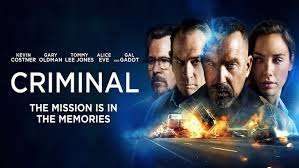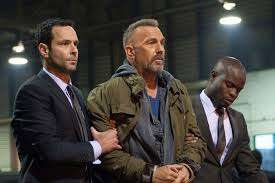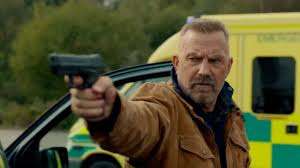In Criminal (2016), director Ariel Vromen takes on an ambitious premise—implanting the memories of a murdered CIA operative into the brain of a death-row inmate—with a capable cast and high-octane aspirations. Yet, despite its promise and flashes of intrigue, Criminal ultimately falters under the weight of its convoluted plot, tonal inconsistencies, and a missed opportunity to explore the deeper philosophical questions it raises.
A Sci-Fi Concept Anchored in Action
The film opens with CIA agent Bill Pope (Ryan Reynolds), who is racing through London on a secret mission to hide “The Dutchman,” a hacker who has created a wormhole-like program capable of hijacking the world’s nuclear defense systems. Pope is caught and killed before he can complete his mission, leaving the CIA in a panic and the hacker’s location unknown.
Enter Jerico Stewart (Kevin Costner), a convicted murderer with an underdeveloped frontal lobe and no sense of empathy—a cold, unpredictable vessel. CIA handler Quaker Wells (Gary Oldman) recruits Dr. Franks (Tommy Lee Jones), a neurologist with an experimental procedure that could transfer Pope’s memories into Jerico’s brain. In theory, Jerico would then be able to access Pope’s knowledge and complete his mission.

The procedure works, albeit imperfectly. Jerico begins to experience flashbacks and sensations foreign to him—memories of Pope’s wife Jill (Gal Gadot), his life, and his ethics. As these fragments take root, Jerico, once emotionless and brutal, slowly transforms into something more human. This shift is central to the film’s character arc but is unfortunately one of the few elements that manages to resonate with emotional weight.
Kevin Costner’s Brutal, Broken Protagonist
Kevin Costner delivers a committed performance, offering perhaps his most physically intense and morally ambiguous character in years. His portrayal of Jerico is initially chilling—a man unbound by conscience and driven by self-interest. However, as Pope’s memories bleed into his own psyche, Jerico becomes more nuanced, and Costner does an admirable job of balancing raw aggression with surprising tenderness.
Still, the character’s transition feels rushed. The film hints at a profound internal conflict, but the script doesn’t allow enough time or space for this transformation to fully develop. One minute Jerico is bashing in heads with a fire extinguisher, and the next, he’s tenderly comforting Pope’s grieving widow. There’s a powerful story in this evolution, but the film skims the surface rather than diving deep.
A Wasted Supporting Cast

The supporting cast reads like a Hollywood dream team, yet most are underutilized or trapped in one-note roles. Gary Oldman plays Quaker Wells at a perpetual boil, shouting orders and raging against bureaucratic constraints with little modulation. It’s an exhausting performance, and Oldman, capable of so much subtlety, is given little opportunity to do more than bluster.
Tommy Lee Jones, as the weary and moral Dr. Franks, has moments of gravitas, but his role is minimal. His scientific breakthrough is the lynchpin of the entire plot, yet the film shows almost no interest in exploring the implications of his work beyond its usefulness as a plot device.
Gal Gadot, meanwhile, is compelling in the limited screen time she has. As Jill Pope, she brings emotional resonance and a quiet strength, especially in scenes with Costner that explore Jerico’s emerging humanity. Unfortunately, she’s mostly sidelined, reduced to a symbol of Pope’s lost life rather than a fully realized character.
High Stakes, Low Tension
The villain of the story, Xavier Heimdahl (played by Jordi Mollà), is a caricature of a techno-terrorist—intelligent, nihilistic, and underwritten. His motivations are vague, his actions arbitrary, and his presence more distracting than menacing. His accomplice, Elsa (Antje Traue), is similarly flat, a cold killer whose only character trait is her ruthlessness.
This is emblematic of a larger issue: while Criminal positions itself as a global thriller with apocalyptic stakes, it never builds the tension necessary to make audiences truly feel the threat. The plot moves through cities, gunfights, and computer screens at a frenetic pace, but rarely pauses to make us care. The emotional core—Jerico’s journey—is undermined by the film’s obsession with action sequences and espionage tropes.
Style Over Substance

Visually, Criminal is stylish but uninspired. The action sequences are competent, occasionally brutal, and sometimes inventive—particularly when Jerico’s unpredictable violence is unleashed—but they lack the distinctive flair that might elevate them above standard genre fare.
Vromen’s direction is slick but feels rushed, as though he’s racing to tick off every action-thriller checkbox. The editing is rapid and occasionally disorienting, especially during fight scenes, while the score is forgettable, underscoring tension without ever enhancing it.
One of the most glaring issues is the lack of thematic depth. The concept of memory transference opens up fascinating ethical and philosophical questions—what makes us who we are? Can one man’s memories redeem another? What is the nature of identity? The film occasionally brushes against these ideas but never commits to exploring them. Instead, it falls back on chase scenes and shootouts.
Missed Potential
Criminal has a fascinating premise and the bones of a compelling sci-fi drama. There’s a more introspective, character-driven version of this film buried under the noise—one where Jerico’s transformation is the central focus, where the morality of memory manipulation is interrogated, and where the relationships between characters are given time to breathe.
Instead, what we get is a conventional action thriller that sacrifices nuance for speed. It’s not a bad film—it’s competently made and occasionally entertaining—but it’s also forgettable, a movie that will likely fade from memory soon after the credits roll.
Final Verdict
Despite strong performances—particularly from Kevin Costner—and an intriguing concept, Criminal (2016) fails to live up to its potential. The film tries to juggle cerebral science fiction, character study, and action spectacle but drops several balls in the process. For audiences looking for a brisk, gritty thriller, Criminal delivers the basics. But for those hoping for a thought-provoking sci-fi drama, it comes up short.





